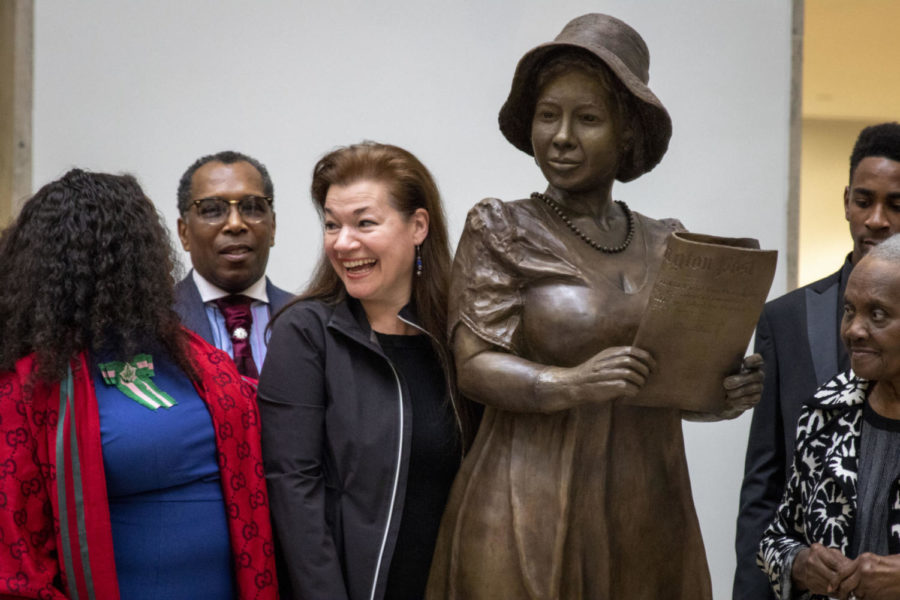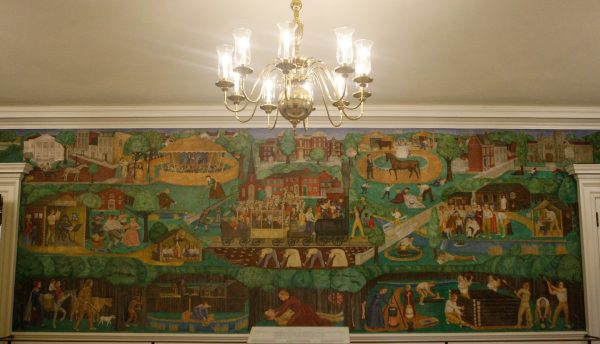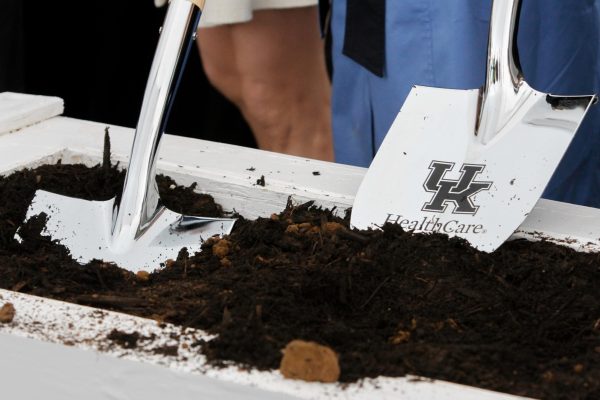Event at UK celebrates, aims to ‘resurrect’ story of Alice Dunnigan
February 5, 2019
Many, many people stand on the shoulders of Alice Allison Dunnigan.
It’s a good thing, then, that her shoulders are made of bronze.
A gathering on Feb. 4, 2019, celebrated the life of Dunnigan and her statue, sculpted by Amanda Matthews of Prometheus Art, which currently stands in the William T. Young Library rotunda at UK.
READ: Iconic: After a lifetime of breaking barriers, Alice Dunnigan is memorialized in bronze
Throughout the program, several people stressed the importance of the foundation that Dunnigan laid for women and people of color, allowing people today to build upon her work.
“As I share with our students, faculty and staff often, we really are standing on the shoulders of others that have gone before us, and Ms. Dunnigan is truly one of those giants whose shoulders we stand upon,” said Dr. Sonja Feist-Price, UK vice president of the office for institutional diversity, who gave an introduction at the event.
Matthews, who said she is the only female CEO of a bronze foundry that she knows of, expressed a similar sentiment.
“We all stand on the shoulders of those who have come before us to do what we are able to do,” she said.
The program, which was co-sponsored by the UK School of Journalism and Media and the Bluegrass chapter of the Society of Professional Journalists, was held on Monday afternoon in the Willy T. auditorium, just a few yards away from the Dunnigan statue.
A program was originally scheduled for Monday evening, but it was canceled after unforeseen circumstances kept one of the main speakers, editor of Dunnigan’s autobiography Carol McCabe Booker, from being able to attend.
This new event, which was originally going to be an informal gathering for Dunnigan’s family members, solidified into a program led by the family.
The entire event certainly was a family affair: Penny Allison Lockhart facilitated the event, which included a prayer from her husband, Rev. Michael Lockhart; an introduction by her sister, Angela Alice Allison Stephens; a reading of Dunnigan’s biography from her son, Tano Lockhart; and a reading of an essay written by her nephew, Jaden Stephens.
Through this experience, several people said, the Dunnigan extended family has grown.
“Probably the biggest delight of all has been meeting the family, and finding new friends, and having new family become part of our circle, so thank you so much,” Matthews said during the event.
After the ceremony, when the family was taking a group photo with the statue, Penny called for Matthews to join in the photo with them.
And in her closing remarks, Penny said that after having lunch with Feist-Price, she “got a new sister.”
Historians Michael Morrow and Dr. Nancy Dawson also spoke during the program about their work to “resurrect the story of Alice Allison Dunnigan,” in Dawson’s words.
Morrow said he grew up in Russellville and always heard about Dunnigan when he was a kid but didn’t really care.
Until, he said, he read her book.
“It blew my mind…” he said. “From that day on, it’s been my life’s journey to let people know who Alice Dunnigan was.”
Many years later, Morrow told Dawson about this woman who was from Russellville, Kentucky, and had risen to covering the White House and Capitol.
“I would tell people that and they would just look at me like I was crazy,” he said. “But for some reason [her story] fell between the cracks. And we’ve been on a 15- or 20-year journey to pull it back out.”
Both Morrow and Dawson spoke about Dunnigan’s ability to not only report on issues for a mostly black readership but also fight oppression as she was writing. Dunnigan was involved with the civil rights movement in addition to her journalism career.
“Not only was she covering a story about the oppressed people, she was fighting the good fight,” Dawson said.
As another effort to spread Dunnigan’s story, Dawson said she and high school students in Russellville worked on a quilt in Dunnigan’s honor, which she showed to the crowd.
It’s made to look like Dunnigan’s press pass, and it includes copies of her actual press passes, which are held in the Howard University collection.
On the quilt, the students chose to include the phrase, “The pen is her weapon.”
This event celebrated her achievements long after she died, with a statue of a black woman standing on a historically mostly white campus.
“During the time of Alice Dunnigan, when she was going to college, she probably wouldn’t have been able to enroll at the University of Kentucky…” Dawson said. “We’re here today with a statue of her here today; that says something. It talks about the progress. But despite the progress, there’s a long way to go.”
Several student journalists were in attendance, and Dawson challenged them to be the kind of journalist that Dunnigan was: telling stories that count.
“Her pen is still speaking, long after she died,” Dawson said.
The statue will be at UK for a few more days before it moves on to its next location. In August, it will be installed in its permanent home in Russellville, Kentucky.




















































































































































